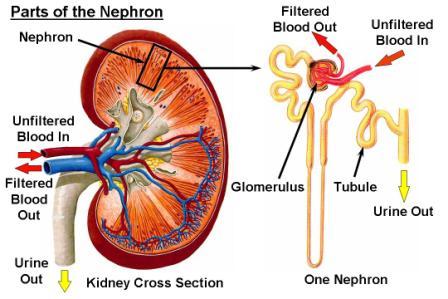Creatinine is an endogenous substance formed from creatine phosphate during muscle metabolism. In humans with normally functioning kidneys, creatinine is filtered mainly at the glomerulus, with no tubular reabsorption. The rate at which creatinine is filtered from the blood reflects the glomerular filtration rate of the kidneys.
Normal creatinine clearance is generally assumed to be between 100 and 125 mL/min per 1.73 square meters for a subject of ideal body weight. For a female the average is 108.8 +/- 13.5 mL/min and for a male the average is 124.5 +/- 9.7 mL/min.
Production of creatinine is roughly equal to creatinine excretion. Since the normal creatinine production decreases with age and increases with lean body weight, the expected value of the creatinine clearance can be calculated from the Cockcroft-Gault equation as:
Clcr = [140 – age] [weight] / [72 Ccr]
where Ccr is the creatinine concentration in mg/dL. For females, the result is taken as 90% of this value.
The calculation uses the lean body weight, which is the lesser of the actual weight or one of the following equations:
For males: LBW = 50 kg + 2.3 kg for each inch over 5 ft
For
females: LBW=45.5 kg + 2.3 kg for each inch over 5 ft
|
Group |
Description |
Creatinine Clearance(mL/min) |
|---|---|---|
|
1 |
Normal renal function |
>80 mL/min |
|
2 |
Mild renal impairment |
50-80 mL/min |
|
3 |
Moderate renal impairment |
30-50 mL/min |
|
4 |
Severe renal impairment |
<30 mL/min |
|
5 |
End-stage renal disease |
Requires dialysis |
